一般过去时专项练习及动词过去式变化规则
小学一般过去时专项训练题及答案
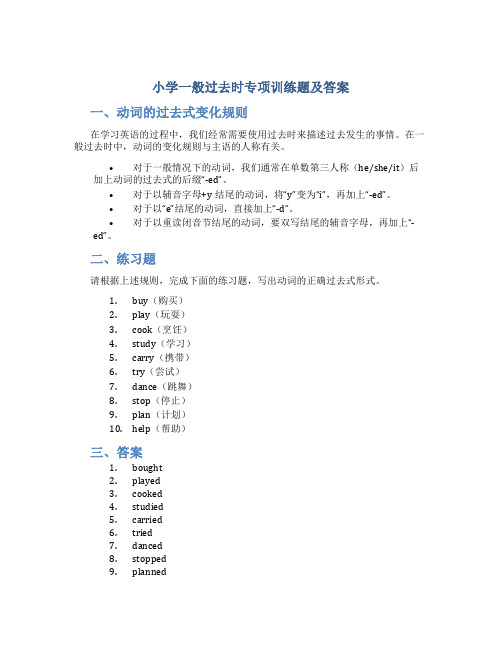
小学一般过去时专项训练题及答案
一、动词的过去式变化规则
在学习英语的过程中,我们经常需要使用过去时来描述过去发生的事情。在一般过去时中,动词的变化规则与主语的人称有关。
•对于一般情况下的动词,我们通常在单数第三人称(he/she/it)后加上动词的过去式的后缀“-ed”。
•对于以辅音字母+y结尾的动词,将“y”变为“i”,再加上“-ed”。
•对于以“e”结尾的动词,直接加上“-d”。
•对于以重读闭音节结尾的动词,要双写结尾的辅音字母,再加上“-ed”。
二、练习题
请根据上述规则,完成下面的练习题,写出动词的正确过去式形式。
1.buy(购买)
2.play(玩耍)
3.cook(烹饪)
4.study(学习)
5.carry(携带)
6.try(尝试)
7.dance(跳舞)
8.stop(停止)
9.plan(计划)
10.help(帮助)
三、答案
1.bought
2.played
3.cooked
4.studied
5.carried
6.tried
7.danced
8.stopped
9.planned
10.helped
四、知识点总结
通过以上练习题,我们了解了动词在一般过去时中的变化规则。掌握这些规则对于正确使用过去时非常重要。
需要注意的是,一些不规则动词的过去式形式并不按照常规的规则来变换。因此,在学习过程中,我们需要特别注意这些不规则动词,并进行针对性的练习和记忆。
希望以上的练习题对于小学生来说能够帮助加深对一般过去时的理解,提高正确使用过去时的能力。祝大家学习进步!
英语语法一般过去时及练练习题
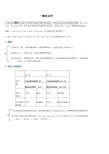
一般过去时
一般过去时表示过去某个时间发生的动作或存在的状态。常和表示过去的时间状语连用。如:last year, yesterday等;也可表示过去经常反复发生的动作,常和often, always等频率副词连用。
例如:I saw him in the street yesterday. 昨天我在街上看见他了。
Li Mei always went to school on foot last year. 去年李梅总是步行上学。
1)结构:
①动词be: 第一人称单数和第三人称单数用was, 其余的人称一律用were。
②动词have: 一律用had, 没有人称和数的变化。
③行为动词:一律用过去式,没有人称和数的变化,行为动词的过去式有两类,一类是规则
动词,另一类是不规则动词。
2)肯定、否定形式
肯定否定
动词
be
I /you/he/she/it was …I /you/he/she/it was not …
We/you/they were …We/you/they were not …
动词
have
主语had …主语had not …
行为动词(study) 主语studied …主语did not study
…
①行为动词的过去时的否定式,要使用助动词 do 的过去式did,后面的谓语动词要为原形
②注意:在非正式语如口语中,was not, were not, had not和did not 可以分别缩写成
wasn’t, weren’t, hadn’t和didn’t。
3)一般疑问句和简略回答
一般疑问句简略回答
一般过去时动词的变化规则
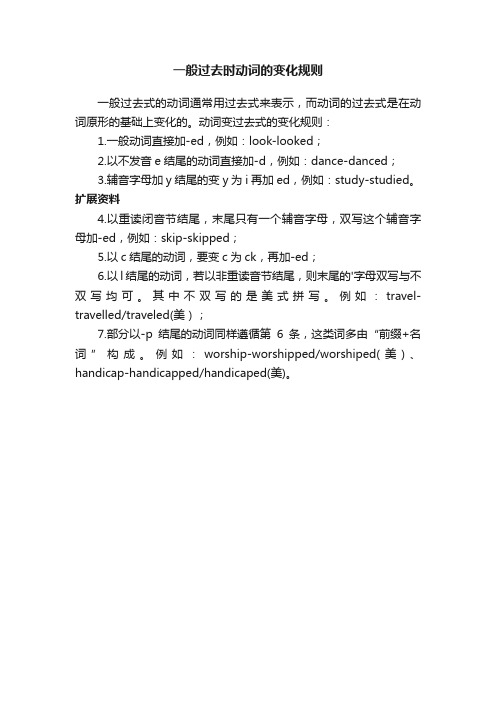
一般过去时动词的变化规则
一般过去式的动词通常用过去式来表示,而动词的过去式是在动词原形的基础上变化的。动词变过去式的变化规则:
1.一般动词直接加-ed,例如:look-looked;
2.以不发音e结尾的动词直接加-d,例如:dance-danced;
3.辅音字母加y结尾的变y为i再加ed,例如:study-studied。扩展资料
4.以重读闭音节结尾,末尾只有一个辅音字母,双写这个辅音字母加-ed,例如:skip-skipped;
5.以c结尾的动词,要变c为ck,再加-ed;
6.以l结尾的动词,若以非重读音节结尾,则末尾的'字母双写与不双写均可。其中不双写的是美式拼写。例如:travel-travelled/traveled(美);
7.部分以-p结尾的动词同样遵循第6条,这类词多由“前缀+名词”构成。例如:worship-worshipped/worshiped(美)、handicap-handicapped/handicaped(美)。
一般过去时专项练习及动词过去式变化规则
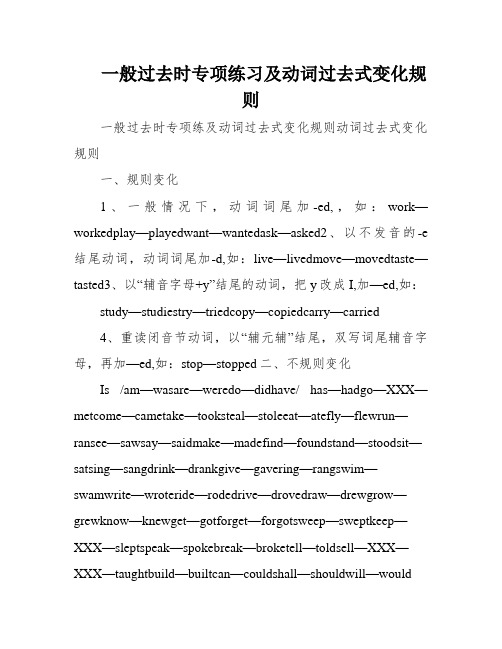
一般过去时专项练习及动词过去式变化规
则
一般过去时专项练及动词过去式变化规则动词过去式变化规则
一、规则变化
1、一般情况下,动词词尾加-ed,,如:work—workedplay—playedwant—wantedask—asked
2、以不发音的-e 结尾动词,动词词尾加-d,如:live—livedmove—movedtaste—tasted
3、以“辅音字母+y”结尾的动词,把y改成I,加—ed,如:study—studiestry—triedcopy—copiedcarry—carried
4、重读闭音节动词,以“辅元辅”结尾,双写词尾辅音字母,再加—ed,如:stop—stopped二、不规则变化
Is /am—wasare—weredo—didhave/ has—hadgo—XXX—metcome—cametake—tooksteal—stoleeat—atefly—flewrun—ransee—sawsay—saidmake—madefind—foundstand—stoodsit—satsing—sangdrink—drankgive—gavering—rangswim—swamwrite—wroteride—rodedrive—drovedraw—drewgrow—grewknow—knewget—gotforget—forgotsweep—sweptkeep—XXX—sleptspeak—spokebreak—broketell—toldsell—XXX—XXX—taughtbuild—builtcan—couldshall—shouldwill—would
一般过去式规则及练习
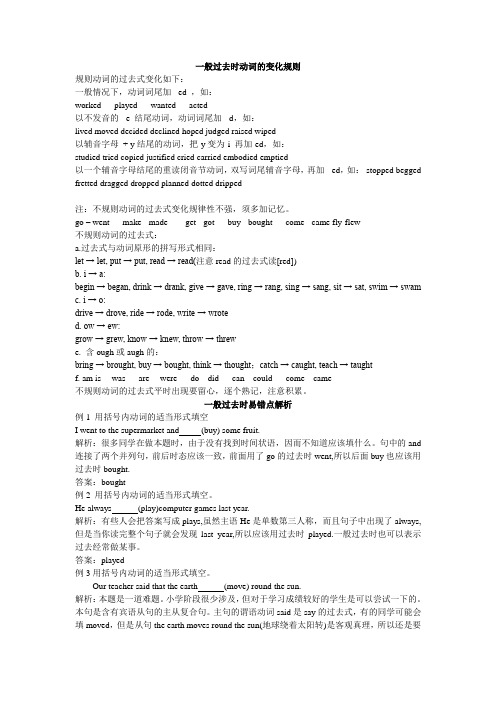
一般过去时动词的变化规则
规则动词的过去式变化如下:
一般情况下,动词词尾加-ed ,如:
worked played wanted acted
以不发音的-e 结尾动词,动词词尾加-d,如:
lived moved decided declined hoped judged raised wiped
以辅音字母+ y结尾的动词,把-y变为-i 再加-ed,如:
studied tried copied justified cried carried embodied emptied
以一个辅音字母结尾的重读闭音节动词,双写词尾辅音字母,再加-ed,如:stopped begged fretted dragged dropped planned dotted dripped
注:不规则动词的过去式变化规律性不强,须多加记忆。
go – went make - made get - got buy - bought come - came fly-flew
不规则动词的过去式:
a.过去式与动词原形的拼写形式相同:
let → let, put → put, read → read(注意read的过去式读[red])
b. i → a:
begin → began, drink → drank, give → gave, ring → rang, sing → sang, sit → sat, swim → swam c. i → o:
drive → drove, ride → rode, write → wrote
一般过去时动词过去式变化规则
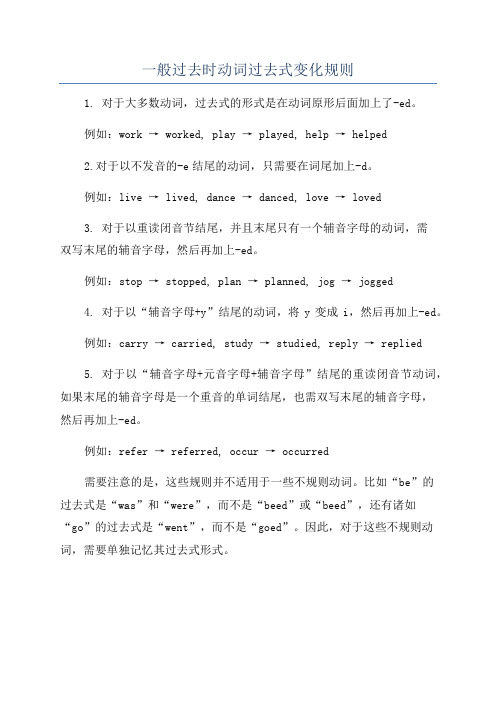
一般过去时动词过去式变化规则
1. 对于大多数动词,过去式的形式是在动词原形后面加上了-ed。
例如:work → worked, play → played, help → helped
2.对于以不发音的-e结尾的动词,只需要在词尾加上-d。
例如:live → lived, dance → danced, love → loved
3. 对于以重读闭音节结尾,并且末尾只有一个辅音字母的动词,需
双写末尾的辅音字母,然后再加上-ed。
例如:stop → stopped, plan → planned,jog → jogged
4. 对于以“辅音字母+y”结尾的动词,将y变成i,然后再加上-ed。
例如:carry → carried, study → studied, reply → replied
5. 对于以“辅音字母+元音字母+辅音字母”结尾的重读闭音节动词,如果末尾的辅音字母是一个重音的单词结尾,也需双写末尾的辅音字母,
然后再加上-ed。
例如:refer → referred, occur → occurred
需要注意的是,这些规则并不适用于一些不规则动词。比如“be”的
过去式是“was”和“were”,而不是“beed”或“beed”,还有诸如“go”的过去式是“went”,而不是“goed”。因此,对于这些不规则动词,需要单独记忆其过去式形式。
英语一般过去时专项练习题
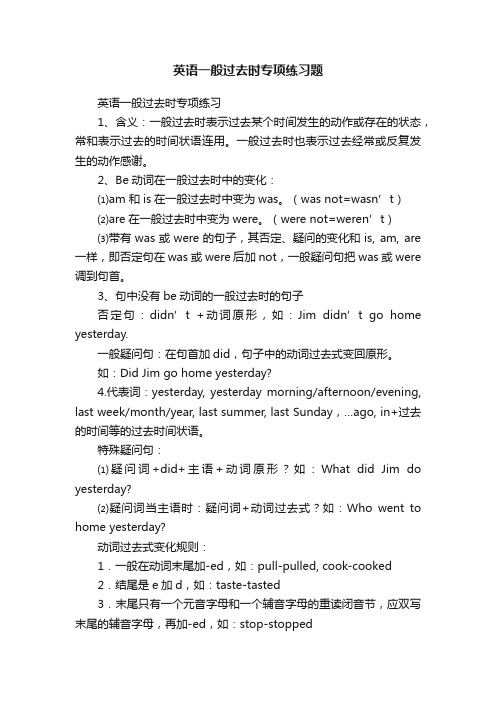
英语一般过去时专项练习题
英语一般过去时专项练习
1、含义:一般过去时表示过去某个时间发生的动作或存在的状态,常和表示过去的时间状语连用。一般过去时也表示过去经常或反复发生的动作感谢。
2、Be动词在一般过去时中的变化:
⑴am 和is在一般过去时中变为was。(was not=wasn’t)
⑵are在一般过去时中变为were。(were not=weren’t)
⑶带有was或were的句子,其否定、疑问的变化和is, am, are 一样,即否定句在was或were 后加not,一般疑问句把was或were 调到句首。
3、句中没有be动词的一般过去时的句子
否定句:didn’t +动词原形,如:Jim didn’t go home yesterday.
一般疑问句:在句首加did,句子中的动词过去式变回原形。
如:Did Jim go home yesterday?
4.代表词:yesterday, yesterday morning/afternoon/evening, last week/month/year, last summer, last Sunday,…ago, in+过去的时间等的过去时间状语。
特殊疑问句:
⑴疑问词+did+主语+动词原形?如:What did Jim do yesterday?
⑵疑问词当主语时:疑问词+动词过去式?如:Who went to home yesterday?
动词过去式变化规则:
1.一般在动词末尾加-ed,如:pull-pulled, cook-cooked
一般过去时-动词过去式变化规则
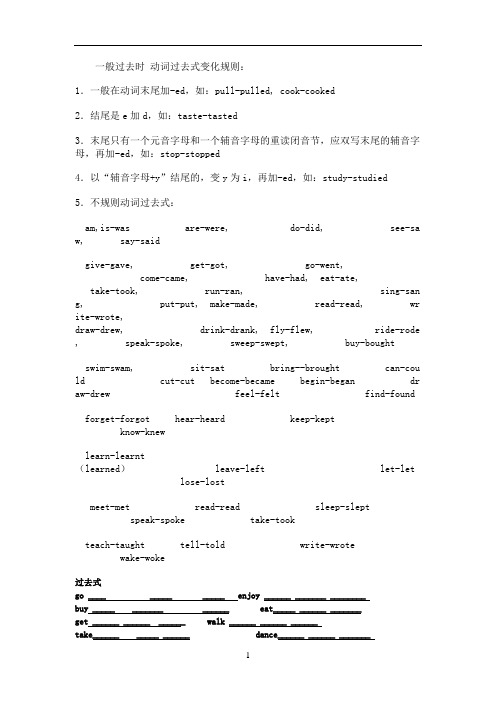
一般过去时动词过去式变化规则:
1.一般在动词末尾加-ed,如:pull-pulled, cook-cooked
2.结尾是e加d,如:taste-tasted
3.末尾只有一个元音字母和一个辅音字母的重读闭音节,应双写末尾的辅音字母,再加-ed,如:stop-stopped
4.以“辅音字母+y”结尾的,变y为i,再加-ed,如:study-studied
5.不规则动词过去式:
am,is-was are-were, do-did, see-sa w, say-said
give-gave, get-got, go-went,
come-came, have-had, eat-ate,
take-took, run-ran, sing-san g, put-put, make-made, read-read, wr ite-wrote,
draw-drew, drink-drank, fly-flew, ride-rode , speak-spoke, sweep-swept, buy-bought
swim-swam, sit-sat bring--brought can-cou ld cut-cut become-became begin-began dr aw-drew feel-felt find-found
forget-forgot hear-heard keep-kept
know-knew
learn-learnt
(learned) leave-left let-let
lose-lost
meet-met read-read sleep-slept
英语语法之一般过去时详解及练习
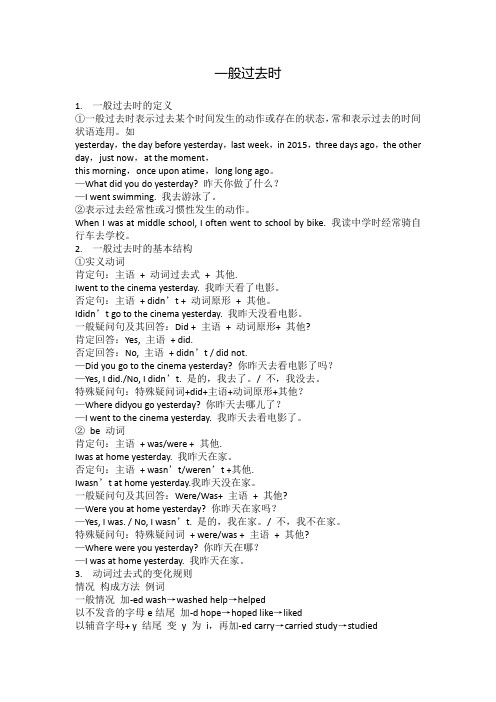
一般过去时
1. 一般过去时的定义
①一般过去时表示过去某个时间发生的动作或存在的状态,常和表示过去的时间状语连用。如
yesterday,the day before yesterday,last week,in 2015,three days ago,the other day,just now,at the moment,
this morning,once upon atime,long long ago。
—What did you do yesterday? 昨天你做了什么?
—I went swimming. 我去游泳了。
②表示过去经常性或习惯性发生的动作。
When I was at middle school, I often went to school by bike. 我读中学时经常骑自行车去学校。
2. 一般过去时的基本结构
①实义动词
肯定句:主语+ 动词过去式+ 其他.
Iwent to the cinema yesterday. 我昨天看了电影。
否定句:主语+ didn’t + 动词原形+ 其他。
Ididn’t go to the cinema yesterday. 我昨天没看电影。
一般疑问句及其回答:Did + 主语+ 动词原形+ 其他?
肯定回答:Yes, 主语+ did.
否定回答:No, 主语+ didn’t / did not.
—Did you go to the cinema yesterday? 你昨天去看电影了吗?
—Yes, I did./No, I didn’t. 是的,我去了。/ 不,我没去。
一般过去时的讲解及练习
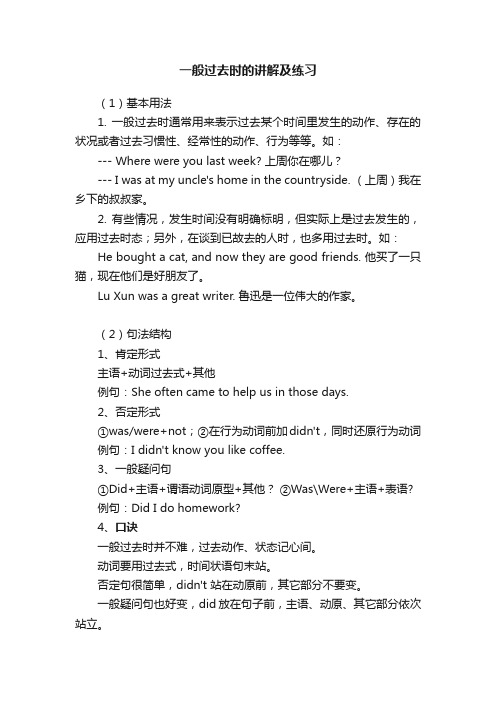
一般过去时的讲解及练习
(1)基本用法
1. 一般过去时通常用来表示过去某个时间里发生的动作、存在的状况或者过去习惯性、经常性的动作、行为等等。如:
--- Where were you last week? 上周你在哪儿?
--- I was at my uncle's home in the countryside. (上周)我在乡下的叔叔家。
2. 有些情况,发生时间没有明确标明,但实际上是过去发生的,应用过去时态;另外,在谈到已故去的人时,也多用过去时。如:He bought a cat, and now they are good friends. 他买了一只猫,现在他们是好朋友了。
Lu Xun was a great writer. 鲁迅是一位伟大的作家。
(2)句法结构
1、肯定形式
主语+动词过去式+其他
例句:She often came to help us in those days.
2、否定形式
①was/were+not;②在行为动词前加didn't,同时还原行为动词
例句:I didn't know you like coffee.
3、一般疑问句
①Did+主语+谓语动词原型+其他?②Was\Were+主语+表语?
例句:Did I do homework?
4、口诀
一般过去时并不难,过去动作、状态记心间。
动词要用过去式,时间状语句末站。
否定句很简单,didn't 站在动原前,其它部分不要变。
一般疑问句也好变,did放在句子前,主语、动原、其它部分依次站立。
特殊疑问句也简单,疑问词加一般疑问句记心间。
一般过去时讲解及练习题
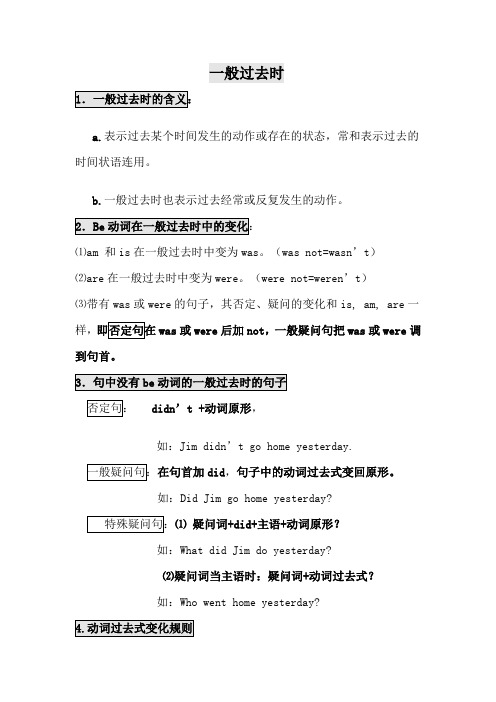
一般过去时
a.表示过去某个时间发生的动作或存在的状态,常和表示过去的时间状语连用。
b.一般过去时也表示过去经常或反复发生的动作。
⑴am 和is在一般过去时中变为was。(was not=wasn’t)
⑵are在一般过去时中变为were。(were not=weren’t)
⑶带有was或were的句子,其否定、疑问的变化和is, am, are一
样,was或were后加not,一般疑问句把was或were调到句首。
didn’t +动词原形,
如:Jim didn’t go home yesterday.
在句首加did,句子中的动词过去式变回原形。
如:Did Jim go home yesterday?
⑴疑问词+did+主语+动词原形?
如:What did Jim do yesterday?
⑵疑问词当主语时:疑问词+动词过去式?
如:Who went home yesterday?
1.一般在动词末尾加-ed,如:pull-pulled, cook-cooked 2.结尾是e加d,如:taste-tasted
3.末尾只有一个元音字母和一个辅音字母的重读闭音节,应双写末尾的辅音字母,再加-ed,如:stop-stopped
4.以“辅音字母+y”结尾的,变y为i,再加-ed,如:study-studied
一般过去时练习题
一.写出下列动词的过去式
is\am_________ fly_______ plant________ are ________
drink_________ play_______ go________ make ________
一般过去时词的过去式 变化规则和练习
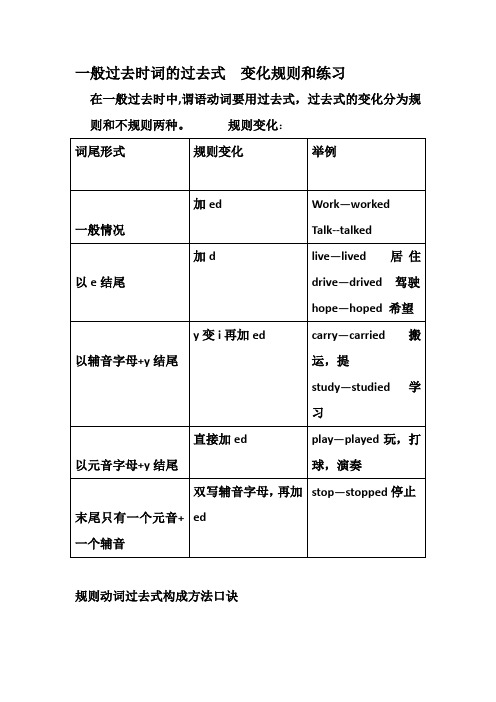
一般过去时词的过去式变化规则和练习
在一般过去时中,谓语动词要用过去式,过去式的变化分为规则和不规则两种。规则变化:
规则动词过去式构成方法口诀
过去式构成有规律,一般词尾加ed ,如果词尾有个e, 只要直接加上d,
辅音字母加上y, 变y为i加ed, 一个元音一个辅音,双写词尾加ed
●过去式词的练习
try____ cry____ stay____ walk____ watch____ open____ close____ rain____ turn_____ arrive______ help______ listen______ change____ look____ reply ____ want____ beg____ plan____ prefer ____ like ______ dance______ love____ look _____ tidy____ wash_____
● 1. I ____ ( work) to the school yesterday.
2.She ____ (drive) a bus before.
3. It ____ (rain) last
Sunday.
4. The dog _____ (help) the blind man two years ago.
5. I ____ (listen) to the music last night.
6. The little sister _____ (dance) last night.
7. The bus _____(stop) yesterday afternoon.
(完整版)一般过去式动词及句型变化规律
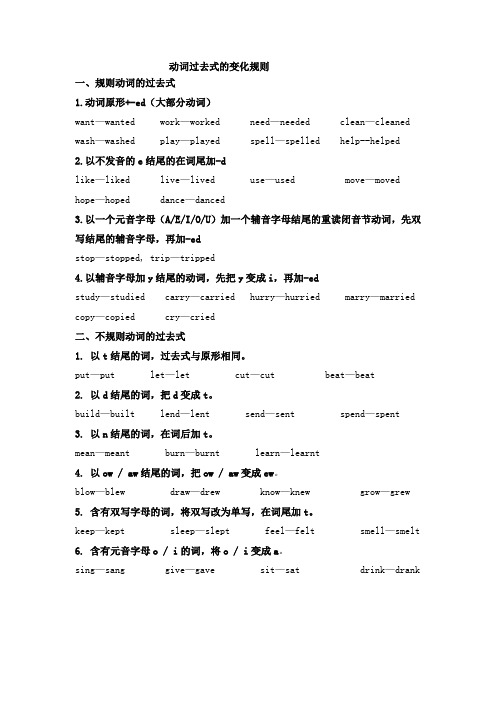
动词过去式的变化规则
一、规则动词的过去式
1.动词原形+-ed(大部分动词)
want—wanted work—worked need—needed clean—cleaned wash—washed play—played spell—spelled help--helped
2.以不发音的e结尾的在词尾加-d
like—liked live—lived use—used move—moved hope—hoped dance—danced
3.以一个元音字母(A/E/I/O/U)加一个辅音字母结尾的重读闭音节动词,先双写结尾的辅音字母,再加-ed
stop—stopped, trip—tripped
4.以辅音字母加y结尾的动词,先把y变成i,再加-ed
study—studied carry—carried hurry—hurried marry—married copy—copied cry—cried
二、不规则动词的过去式
1. 以t结尾的词,过去式与原形相同。
put—put let—let cut—cut beat—beat
2. 以d结尾的词,把d变成t。
build—built lend—lent send—sent spend—spent
3. 以n结尾的词,在词后加t。
mean—meant burn—burnt learn—learnt
4. 以ow / aw结尾的词,把ow / aw变成ew。
blow—blew draw—drew know—knew grow—grew 5. 含有双写字母的词,将双写改为单写,在词尾加t。
一般过去式及练习
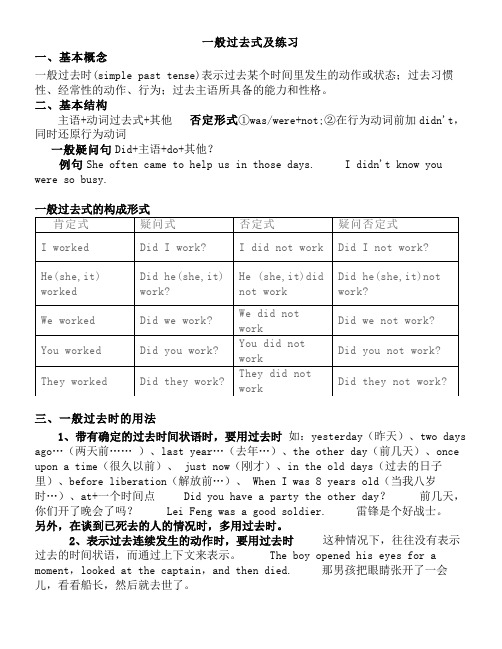
一般过去式及练习
一、基本概念
一般过去时(simple past tense)表示过去某个时间里发生的动作或状态;过去习惯性、经常性的动作、行为;过去主语所具备的能力和性格。
二、基本结构
主语+动词过去式+其他否定形式①was/were+not;②在行为动词前加didn't,同时还原行为动词
一般疑问句Did+主语+do+其他?
例句She often came to help us in those days. I didn't know you were so busy.
一般过去式的构成形式
肯定式疑问式否定式疑问否定式
I worked Did I work? I did not work Did I not work?
He(she,it) worked Did he(she,it)
work?
He (she,it)did
not work
Did he(she,it)not
work?
We worked Did we work? We did not
work
Did we not work?
You worked Did you work? You did not
work
Did you not work?
They worked Did they work? They did not
work
Did they not work?
三、一般过去时的用法
1、带有确定的过去时间状语时,要用过去时如:yesterday(昨天)、two days ago…(两天前……)、last year…(去年…)、the other day(前几天)、once upon a time(很久以前)、 just now(刚才)、in the old days(过去的日子里)、before liberation(解放前…)、 When I was 8 years old(当我八岁时…)、at+一个时间点Did you have a party the other day?前几天,你们开了晚会了吗?Lei Feng was a good soldier. 雷锋是个好战士。
一般过去式动词及句型变化规律
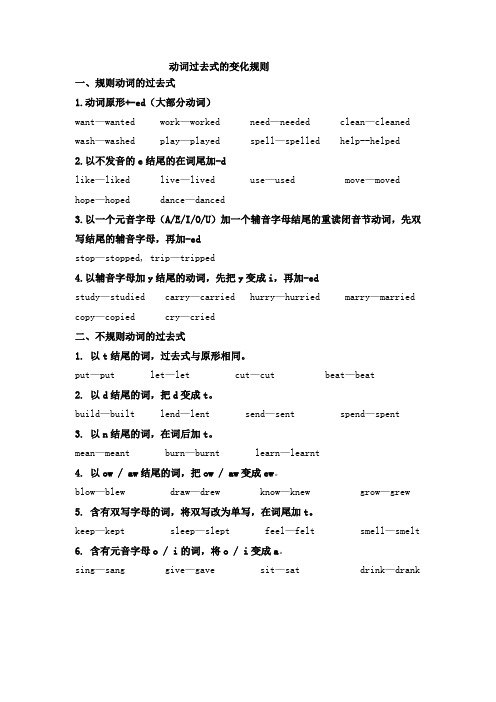
动词过去式的变化规则
一、规则动词的过去式
1.动词原形+-ed(大部分动词)
want—wanted work—worked need—needed clean—cleaned wash—washed play—played spell—spelled help--helped
2.以不发音的e结尾的在词尾加-d
like—liked live—lived use—used move—moved hope—hoped dance—danced
3.以一个元音字母(A/E/I/O/U)加一个辅音字母结尾的重读闭音节动词,先双写结尾的辅音字母,再加-ed
stop—stopped, trip—tripped
4.以辅音字母加y结尾的动词,先把y变成i,再加-ed
study—studied carry—carried hurry—hurried marry—married copy—copied cry—cried
二、不规则动词的过去式
1. 以t结尾的词,过去式与原形相同。
put—put let—let cut—cut beat—beat
2. 以d结尾的词,把d变成t。
build—built lend—lent send—sent spend—spent
3. 以n结尾的词,在词后加t。
mean—meant burn—burnt learn—learnt
4. 以ow / aw结尾的词,把ow / aw变成ew。
blow—blew draw—drew know—knew grow—grew 5. 含有双写字母的词,将双写改为单写,在词尾加t。
一般过去时的用法和专题练习
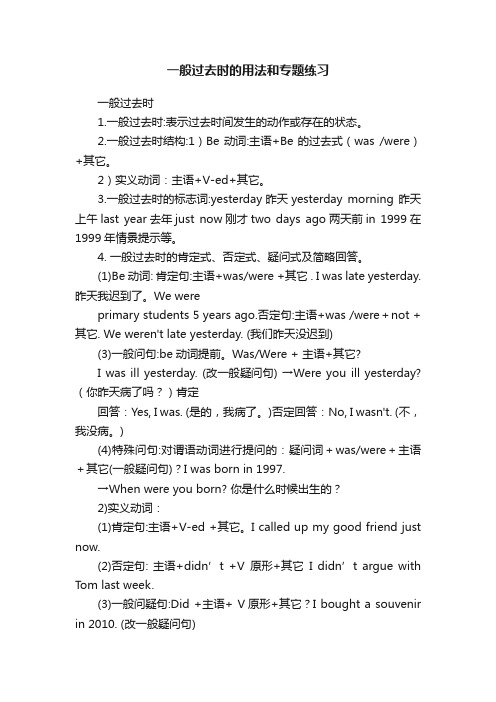
一般过去时的用法和专题练习
一般过去时
1.一般过去时:表示过去时间发生的动作或存在的状态。
2.一般过去时结构:1)Be动词:主语+Be的过去式(was /were)+其它。
2)实义动词:主语+V-ed+其它。
3.一般过去时的标志词:yesterday昨天yesterday morning 昨天上午last year去年just now刚才two days ago两天前in 1999在1999年情景提示等。
4. 一般过去时的肯定式、否定式、疑问式及简略回答。
(1)Be动词: 肯定句:主语+was/were +其它 . I was late yesterday. 昨天我迟到了。We were
primary students 5 years ago.否定句:主语+was /were+not +其它. We weren't late yesterday. (我们昨天没迟到)
(3)一般问句:be动词提前。Was/Were + 主语+其它?
I was ill yesterday. (改一般疑问句) →Were you ill yesterday? (你昨天病了吗?)肯定
回答:Yes, I was. (是的,我病了。)否定回答:No, I wasn't. (不,我没病。)
(4)特殊问句:对谓语动词进行提问的:疑问词+was/were+主语+其它(一般疑问句)?I was born in 1997.
→When were you born? 你是什么时候出生的?
2)实义动词:
(1)肯定句:主语+V-ed +其它。I called up my good friend just now.
- 1、下载文档前请自行甄别文档内容的完整性,平台不提供额外的编辑、内容补充、找答案等附加服务。
- 2、"仅部分预览"的文档,不可在线预览部分如存在完整性等问题,可反馈申请退款(可完整预览的文档不适用该条件!)。
- 3、如文档侵犯您的权益,请联系客服反馈,我们会尽快为您处理(人工客服工作时间:9:00-18:30)。
一般过去时专项练习及动词过去式变化规则
动词过去式变化规则
一、规则变化
1、一般情况下,动词词尾加-ed,,如:work—worked play—played want—wanted ask—asked
2、以不发音的-e结尾动词,动词词尾加-d,如:live—lived move—moved taste—tasted
3、以“辅音字母+y”结尾的动词,把y改成I,加—ed, 如:
study—studies try—tried copy—copied carry—carried
4、重读闭音节动词,以“辅元辅”结尾,双写词尾辅音字母,再加—ed, 如:stop—stopped
二、不规则变化
Is /am—was are—were do—did have/ has—had go—went meet—met come—came take—took steal—stole eat—ate fly—flew run—ran see—saw say—said make—made find—found stand—stood sit—sat sing—sang drink—drank give—gave ring—rang swim—swam write—wrote ride—rode drive—drove draw—drew grow—grew know—knew get—got forget—forgot sweep—swept keep—kept sleep—slept speak—spoke break—broke tell—told sell—sold buy—bought think—thought catch—caught teach—taught build—built can—could shall—should will—would
过去式与动词原形一样:let—let must—must put—put read—read
三、动词过去式构成读音
1、清辅音后读清辅音[t] (清读清)如:jump like
2、浊辅音后读浊辅音[d] (浊读浊)如:listen pull
3、元音后面读浊辅音[d] (元音后面读浊音)如:water play
4、[t][d]后面读[id] want need
一般过去时专项练习
一、写出下列动词的过去式
1.am/is ______
2.do _______
3.go ________
4.have _______
5.isn’t _________
6. ar en’t ________
7.spend________8.cook_______9.read________10.clean_______ 11.live _______ 12.study_________
三、用括号内所给词的适当形式填空
1. We _________ (enjoy) ourselves at the party last night.
2.Jack ____________ (study) for the English test last Sunday.
3._______ you ______ (go) to the Great Wall last year?
4. What day _______ (be) it yesterday?
5.The old man _______(be)ill and went to see a doctor.
6.We ________ (have) a party last night.
7.We __________ (visit) the museum and went home.
8.— How _______ (be) the students? — They were very friendly.
9.He often _______ (have) supper at home. Today he ______ (have) supper at school.
10.— ______ he _______ (have) lunch at nine? —No, he didn’t.
11.They _________(buy) a guitar yesterday.
五、选择填空
( ) 1. Lee ____ his mobile phone at home. A. leave B. leaves C. leaved D. left
( ) 2. ___ he ___a good rest? No, he didn’t. A. Do, had B. Did, have C. Did, had D. Was, had ( ) 3. As soon as he __, he _ to his family.
A. arrived, writes
B. arrived, written
C. arrived, wrote
D. arriveds, write
( ) 4. Mr. Black was late because he _______ his way. A. losted B. lose C. loses D. lost ( ) 5. When _________ Lee ________ school this morning?
A. did, got to
B. did, get to
C. did, get
D. did, got
( ) 6. Will you please say it again? I _ quite __you.
A. didn’t, hear
B. don’t, heard
C. didn’t, heard
D. don’t, hear
( ) 7. _you __at six o’clock yesterday? A. Do ,ge t up B. Did, get up C. Do, got up D. Did, got up ( ) 8.What did you see ____? A. now B. every day C. these days D. just now
( ) 9.He went into the room and ____ the door. A. lock B. locking C. locks D. locked ( ) 10. What __ you __last week? I bought a bag.A. did ,buy B. did , bought C. do, buy D. do, bought ( ) 11. —__he __his lunch? — Yes, he did. A. Does ,has B. Does, have C. Did, have D. Did, had ( )12.—Did the thieves _____ into the car? —No, they______.
A. fell, didn’t
B. fall(落下), did
C. jump(跳), didn’t
D. jump, did
( ) 13. -When did May come back from Hong Kong? -She __ from Hong Kong last Friday.
A. come back
B. comes back
C. returned back
D. came back
( ) 14. ____ she _____ this dictionary in the bookshop nearby last week?
A. Did, buy
B. Does, buy
C. Did, bought
D. Does, buys
( ) 15. He ____ to the station this morning and was______ for the train.
A. hurry, in time
B. hurries, on time
C. hurried, in time
D. hurried, at time
( ) 16. Where _____ Uncle Sun yesterday? A. was B. were C. did D. does
( ) 17. —Have you seen him today? —Yes, I ____ him this morning.
A. seeing
B. see
C. sees
D. saw
( ) 18. He ____worried when he heard the news. A. is B. was C. does D. did
( ) 19. There ___ a telephone call for my brother Steven yesterday? A. is B. are C. was D. were ( ) 20. Liu Fengwei _____ three yuan for the lost library book.
A. paid
B. pay
C. spent
D. lost
( ) 21. He __ in this school in 1958. A. taught B. teach C. teaches D. teaching
( ) 22. They __ tired so they stopped __a rest.
A. are, have
B. were, have
C. were, to have
D. are, having
( ) 23. Yesterday I _____ in bed all day because I had a fever. A. lay B. lie C. laid D. lied ( ) 24. It was raining hard when he ____ home. A. got B. get C. gets D. was getting
( ) 25. She said her brother ____ in Beijing. He ______ to Japan on business last week.
A. wasn’t, went
B. hasn’t, went
C. wasn’t, go
D. isn’t, went
七、用所给动词的适当形式填空
1.Tom and Mary ___________ (come) to China last month.
2.Mary __________ (read) English yesterday morning.
3.There _________ (be) no one here a moment ago.
4.I ___________ (call) Mike this morning.
5.I listened but ___________ (hear) nothing.
6.Tom ___________ (begin) to learn Chinese last year.
st week we _________ (pick) many apples on the farm.
